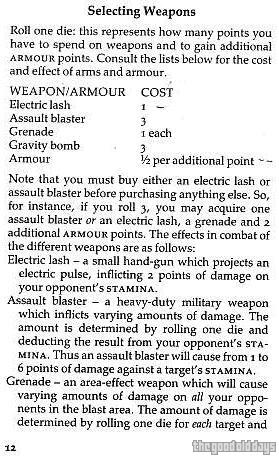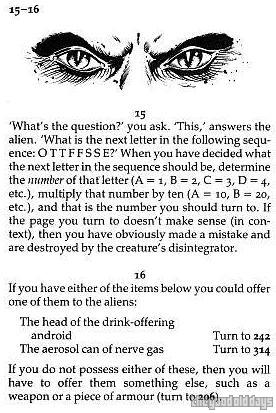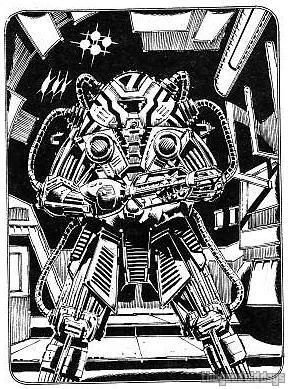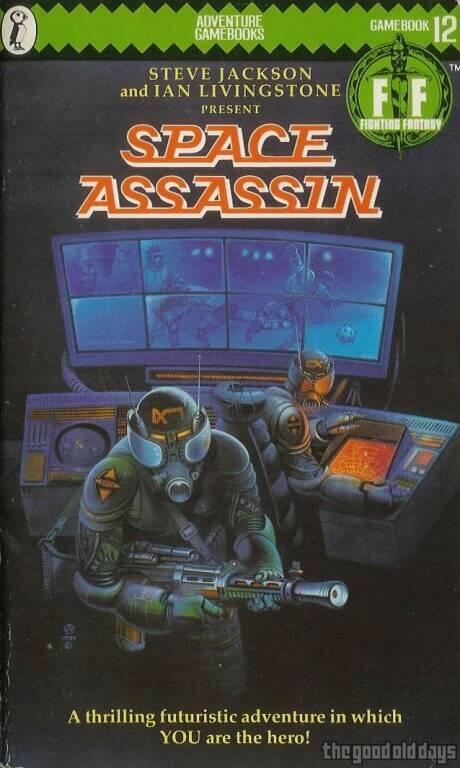Thoughts by Mr Creosote (02 00 2023) – Gamebook
We have to thank Andrew Chapman, author of Space Assassin, for telling the story of how this book came to be . He also gave his side of how his involvement in the line ended . All this gives us invaluable insights into how things worked around the Fighting Fantasy line of gamebooks in the 1980s.
The beginning of his involvement does indeed explain a lot of observations when playing through this book. It very closely imitates The Warlock of Firetop Mountain, down to the identical three-part structure of a long corridor of choices “Do you want to open the door to your side or continue?”, then a maze which can and needs to be freely traversed, and finally a series of more or less climactic encounters at the end.

Set in a science fiction theme on the surface, the task is to arrest an evildoer on his giant spaceship. Which de facto is nothing more than a fantasy dungeon in disguise. Like most literature labelled SciFi, this is in fact just an adventure story. The word “orc” replaced by “guard robot”, there we are.
By the time Space Assassin was actually released, the line had moved beyond the conceptual stage presented by the original book. To no fault of Andrew Chapman, it took this long to get his take on it released. Having seen much more rich books, both concerning their game mechanics and their storytelling and worldbuilding, his first attempt feels incredibly poor. Which, to a large degree, must also be blamed on his writing. To illustrate:
Through the door is a small kitchen and dining-area; once again everything is decorated in an alien style designed to make human behaviour difficult.
First of all, is this even true? Is making human behaviour difficult really the intent of the design? Second, if you go for something like this, how about… you know… describing in what way this is different from we humans are used to? Instead of just stating that it is. Adding insult to injury, we later enter another kitchen, of which it says:

The door leads to s small kitchenette with a delightful aroma – a pot of coffee is sitting, begging to be drunk, and on a sideboard are some fresh sandwiches!
So much for the non-human part. This lack of consistency carries over into the gameplay as well. Such as when, for example, the protagonist steals some identification badges off a pair of scientists only to run into a guard robot promptly after. The robot asks for identification. Though showing one of the badges just received is not even offered as an option. Instead, you can choose to fight or to bluff. Bluff a robot, sure.
The book being all over the place on all counts, it is almost devoid of any memorable encounters or scenes. The exchange with the robotic ship pilot maybe being one of the few exceptions. This philosophical conversation is completely without consequence. There is no pass or fail with respect to succeeding in the main mission here, and the whole branch can be skipped by just blasting the pilot immediately.
It simply illustrates once more how ill-conceived Space Assassin is, from start to finish. By far most choices boil down to random picks, as no indication is given as to which one may lead to what. Plotting is non-existent and writing is poor. I’m sure that after first encountering one of the Fighting Fantasy books, many older teens or young adults felt they could do it, too. They sat down at their desks and started writing. Most such attempts were very likely no good. Though the vast majority of such attempts never got commercially published. All the more surprising that Andrew Chapman became responsible for some quite decent books further down the road…


